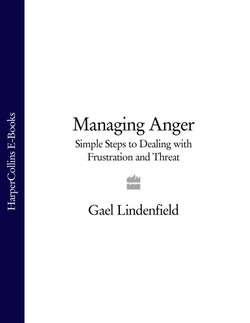Читать книгу Managing Anger: Simple Steps to Dealing with Frustration and Threat - Gael Lindenfield, Gael Lindenfield - Страница 27
ANGER CAN FUEL OBSESSIONS, PHOBIAS AND ADDICTIONS
ОглавлениеObsessions and phobias originate from situations when, for some reason or other, we feel we are either losing control of ourselves or the world around us. Psychologists refer to them as defence mechanisms. They seem to arise naturally in all cultures. On a large scale, we notice nations who feel under threat often revive old rituals and become more obsessive in their religious practices. At the level of the organization, we see more bureaucracy and obsession with corporate image and practice, as the people at the top have a sense of losing control.
On a smaller scale, we can observe young children becoming obsessive and phobic when they are learning to cope with the feelings aroused by the frustrations and insecurities of the outside world. For example, they may not be able to sleep without going through certain bedtime rituals; they can become obsessed with one story, toy, blanket, or piece of clothing, or develop ‘food fads’. One of my favourite books was the Winnie the Pooh poems. I was particularly taken by one about walking on the cracks of paving stones, and for many years would find myself doing this as I walked to school. Perhaps this obsessive behaviour saved many children and teachers from receiving the ‘bashing-up’ that I secretly fantasized about giving them.
Any parent who has had to cope with this kind of behaviour knows that the answer does not lie in confronting the ‘symptom’ – in fact, doing so, can often make matters worse. For example, You’re a big boy now, you don’t need Teddy’ just makes a child hold on tighter. The obsessive behaviour also becomes worse whenever the child feels hurt, threatened or anxious.
Fortunately, most parents do find (often through a process of trial and error!) that they can help the child let go of these obsessions and phobias by dealing with the feelings that underlie them. But, if these feelings happen to be anger, in either a family or national culture where this emotion is taboo, they will stand little chance of being fully aired. Consequently, a child may never learn how to manage this emotion and will grow up relying on obsessive or phobic rituals to feel some sense of control over his or her frustration and anger. So, when these children become adults and are, for example, unfairly criticized or let down, instead of expressing the forbidden emotion, they can be observed indulging in their compulsion to eat or work, shop, clean, tidy, wash, drink, smoke, seek isolation, find an open space, etc.
Unfortunately, people who live in close proximity to someone with obsessive or phobic tendencies are usually not much help. They tend to ‘live with’ their friend or spouse’s ‘peculiarities’ because they learn that to rock the boat means that they may get an outburst of frightening pent-up rage. In turn, they too hold on to their feelings and the relationship slides into superficial blandness.
I first noticed this phenomena when, many years ago, I started a self-help group for phobics. Everything seemed so suspiciously nice – the husbands and wives were so ‘wonderful’ and ‘understanding’ and even the children were so ‘good’ – but the relationships lacked passion and excitement. The groups became very cosy, pleasant venues for people to sit around and swap interesting developments in their symptoms intermingled with tale after tale of kindnesses that they had experienced. Eventually I experimented with more confrontative therapy which drew out all kinds of buried resentments about sick mothers, alcoholic fathers, abusive grandfathers, bullies at school, unjust discrimination, frightening traumas, etc. It was very rewarding to watch the growth of confidence, spontaneity and creativity in people as they learned to admit and safely express the buried feelings from the past and then begin to use their new skills to add some spice to their current relationships.
During this therapeutic process, which I have used hundreds of times since, the phobias and obsessions begin to take more of a back seat. Some even gradually fade away of their own accord. The more ingrained habits sometimes need the additional help of behavioural step-by-step techniques, but at least, with the anger acknowledged, there seems to be more energy and motivation with which to tame or eradicate them.
Although I would not claim that repressed anger is at the root cause of all these kinds of symptoms, I have certainly seen enough evidence with my own eyes to convince me that anyone who finds themselves locked in a compulsion should at least ask themselves the question: ‘What feelings might I be trying to control?’ And I would be very surprised if anger did not feature regularly amongst the replies.
